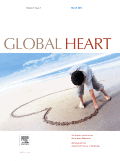
Global Heart
Scope & Guideline
Championing open access to vital cardiovascular discoveries.
Introduction
Aims and Scopes
- Global Cardiovascular Health:
The journal covers a wide range of cardiovascular health topics with a global perspective, focusing on the epidemiology, prevention, and management of cardiovascular diseases across diverse populations. - Health Systems and Policy:
Research in this journal often explores how health systems can be optimized to improve cardiovascular care, particularly in low- and middle-income countries, addressing barriers to access and treatment. - Innovative Interventions and Technology:
The journal highlights studies on new interventions, including telemedicine and digital health solutions, to improve cardiovascular health outcomes, especially during the COVID-19 pandemic. - Epidemiological Studies and Risk Factors:
A core area of focus includes the identification and analysis of risk factors for cardiovascular diseases, with an emphasis on socioecological determinants of health. - Gender and Health Disparities:
The journal frequently addresses gender differences in cardiovascular health, understanding how biological and social factors contribute to disparities in disease prevalence and outcomes. - Community-Based Approaches:
Research often emphasizes community engagement and public health initiatives aimed at improving awareness, prevention, and treatment of cardiovascular diseases.
Trending and Emerging
- Impact of COVID-19 on Cardiovascular Health:
Emerging research is increasingly focused on the implications of the COVID-19 pandemic on cardiovascular health, including long-term effects and changes in care delivery. - Social Determinants of Health:
There is a rising trend in studies examining how socioeconomic factors, education, and community resources influence cardiovascular health outcomes, emphasizing a holistic approach to prevention. - Digital Health Innovations:
The integration of digital health technologies and telemedicine in managing cardiovascular diseases is gaining traction, reflecting a shift towards more accessible and scalable healthcare solutions. - Hypertension Management Strategies:
Innovative community-based approaches to hypertension management are increasingly prevalent, focusing on improving treatment adherence and access to care in underserved populations. - Environmental Factors and Cardiovascular Risk:
Research exploring the impact of environmental factors, such as air pollution and urbanization, on cardiovascular health is becoming a more prominent theme, underlining the need for environmental health considerations in cardiovascular research.
Declining or Waning
- Traditional Cardiac Interventions:
There is a noticeable decline in papers focused solely on traditional surgical interventions for cardiovascular diseases, as the emphasis shifts toward non-invasive and community-based strategies. - Acute Care Management:
Research on acute care management of cardiovascular events, such as myocardial infarction, is less frequent, possibly overshadowed by broader studies on prevention and systemic care. - Single-Country Studies:
The journal is moving away from studies that focus exclusively on single-country data towards more global or multi-country analyses that provide comparative insights. - Pharmacological Approaches:
The focus on traditional pharmacological approaches to cardiovascular disease management appears to be waning in favor of studies exploring integrated care models and lifestyle interventions.
Similar Journals
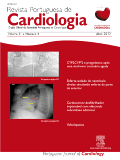
Revista Portuguesa de Cardiologia
Exploring innovative solutions in cardiology since 1970.Revista Portuguesa de Cardiologia, published by Elsevier España SLU, stands as a pivotal resource in the realm of Cardiology and Cardiovascular Medicine. With its origins tracing back to 1970, this journal has cultivated a robust academic presence, achieving a 2023 Q3 ranking in its category, and currently holding a position of #220 out of 387 on the Scopus rankings, placing it within the 43rd percentile of its field. This open access journal, available since 2011, aims to disseminate high-quality research and insights relevant to contemporary cardiovascular issues. Its commitment to accessibility and knowledge exchange enhances its importance for clinicians, researchers, and students alike, fostering a more informed community in the fight against cardiovascular diseases. Operating from its base in Barcelona, Spain, the journal welcomes contributions that further the understanding and treatment of heart conditions, contributing significantly to the advancement of cardiovascular health.
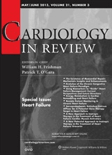
Cardiology in Review
Empowering professionals with essential cardiology insights.Cardiology in Review, published by Lippincott Williams & Wilkins, is a prominent journal focused on advancing the field of cardiology and cardiovascular medicine. With a history of publication spanning from 1995 to 2024, the journal serves as an essential resource for researchers, healthcare professionals, and students alike, offering in-depth reviews and analyses on the latest developments, clinical practices, and research findings in cardiology. Despite being a traditional print journal, it maintains a commendable Q2 ranking in both cardiology and miscellaneous medicine categories as of 2023, reflecting its influence and rigor in the academic community, with a Scopus rank of #132 out of 387 in its field, placing it in the 66th percentile. The journal aims to bridge the gap between clinical practice and emerging research, promoting a deeper understanding and integration of innovative strategies in cardiovascular care. With its commitment to high-quality scholarship, Cardiology in Review remains a vital conduit for knowledge and dialogue within the evolving landscape of cardiovascular health.

Frontiers in Cardiovascular Medicine
Pioneering Research in Cardiology and Beyond.Frontiers in Cardiovascular Medicine is a leading open-access journal published by FRONTIERS MEDIA SA, dedicated to advancing research in the field of cardiology and cardiovascular medicine. Since its inception in 2014, the journal has become a vital platform for the dissemination of high-quality research, boasting a commendable Q2 rank in the 2023 category for Cardiology and Cardiovascular Medicine. With a focus on promoting innovative studies and clinical insights, Frontiers in Cardiovascular Medicine facilitates open access to its content, allowing researchers, healthcare professionals, and students from around the globe to engage with the latest findings which are critical for the advancement of cardiovascular health. The journal's significant presence in the academic landscape, as indicated by its Scopus ranking (161/387 and 58th percentile), underscores its importance as a research outlet in this essential field. Located in Lausanne, Switzerland, the journal continues to support the global cardiovascular community by encouraging collaboration and knowledge sharing to address the challenges faced in cardiovascular medicine today.

ENVIRONMENTAL HEALTH PERSPECTIVES
Connecting communities with impactful environmental health findings.Environmental Health Perspectives (EHP) is a premier open-access journal published by the U.S. Department of Health and Human Services, Public Health Science, dedicated to publishing rigorous and impactful research in the field of environmental health. Since its inception in 1972, EHP has become a leading platform for disseminating knowledge on the interactions between the environment and human health, making significant contributions to the fields of toxicology and public health. With an impressive impact factor and a Q1 ranking in both Health, Toxicology and Mutagenesis and Public Health, Environmental and Occupational Health categories, EHP ranks among the top journals globally, reflecting its high citation and visibility within the academic community. Researchers, professionals, and students alike will find a wealth of vital information within its pages, as EHP covers a wide array of topics related to environmental exposures, health outcomes, and policy implications. Furthermore, EHP engages with a global audience through its commitment to open access, ensuring that critical research is available to all, enhancing the collective understanding of environmental health issues since 1972.
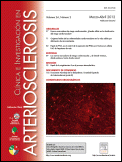
Clinica e Investigacion en Arteriosclerosis
Pioneering research that shapes the future of cardiology.Clinica e Investigacion en Arteriosclerosis is a premier academic journal dedicated to the field of cardiology and cardiovascular medicine, published by ELSEVIER. With its ISSN 0214-9168 and E-ISSN 1578-1879, the journal aims to disseminate high-quality research and innovations in the understanding and treatment of arterial diseases, contributing significantly to both clinical practices and pharmacological advancements. Established in 2007 and continuing into 2024, the journal has garnered recognition with a notable Q3 categorization in both Cardiology and Cardiovascular Medicine and Pharmacology (medical) for 2023, reflecting its impact in the academic community. Researchers and healthcare professionals utilizing this journal will find a diverse range of articles exploring novel therapeutic strategies and epidemiological data, making it an essential resource for advancing knowledge and practice in cardiovascular health. While it does not operate as an open-access journal, the findings published in Clinica e Investigacion en Arteriosclerosis are pivotal for understanding current trends and future directions in cardiovascular research.

HEART
Innovating Cardiology: Where Research Meets PracticeHEART is a leading peer-reviewed journal published by the BMJ Publishing Group, specializing in the field of Cardiology and Cardiovascular Medicine. Established in 1942, the journal has evolved as a premier platform for disseminating high-quality research, innovative practices, and clinical advancements within the cardiovascular domain. With an impressive impact factor and ranked in the Q1 category in 2023, it positions itself among the top-tier journals in its field, boasting a Scopus rank of #37 out of 387 in this highly competitive area, representing the top 10th percentile nationally. The journal supports both traditional and open access options, thereby enhancing the global visibility and reach of its published work. Researchers, professionals, and students alike will find HEART to be an invaluable resource, offering the latest insights and developments that drive the field forward and improve patient care worldwide.
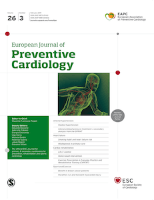
European Journal of Preventive Cardiology
Elevating knowledge in cardiovascular disease prevention.The European Journal of Preventive Cardiology, published by Oxford University Press, is a leading international journal dedicated to the field of cardiology and cardiovascular medicine. With an impact factor that underscores its prestige—ranking in the top quartile (Q1) of both cardiology and epidemiology categories—the journal serves as a critical resource for researchers and practitioners seeking to advance their understanding of preventive strategies in cardiovascular health. Since its inception in 1999, it has provided a platform for high-quality research and reviews that address the epidemiology of cardiovascular diseases, risk factor management, and innovative prevention methodologies. Notably, it currently ranks #21 out of 387 in Medicine - Cardiology and #13 out of 148 in Medicine - Epidemiology according to Scopus, highlighting its influential position in these essential biomedical fields. The journal also provides open access options, allowing both readers and authors the opportunity to engage with groundbreaking research and enhance the dissemination of knowledge. With a commitment to excellence, the European Journal of Preventive Cardiology is an invaluable asset for those dedicated to the prevention of cardiovascular diseases.
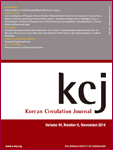
Korean Circulation Journal
Connecting Researchers and Practitioners for Heart Health Advancements.Korean Circulation Journal, published by the Korean Society of Cardiology, has established itself as a prominent platform for disseminating research in the fields of Cardiology and Cardiovascular Medicine. With an ISSN of 1738-5520 and an E-ISSN of 1738-5555, this journal has been at the forefront of cardiovascular science since its inception in 2006 and is projected to continue until 2024. The journal's commitment to quality is reflected in its 2023 category quartiles, ranking in the second quartile (Q2) for both Cardiology and Internal Medicine, as well as its commendable Scopus rankings within the respective fields. Located in South Korea, the journal aims to bridge the gap between cutting-edge research and practical applications, serving as an invaluable resource for researchers, healthcare professionals, and students keen on advancing their understanding of cardiovascular health. Although currently not an open-access journal, it provides a wealth of knowledge that encourages evidence-based practice in clinical settings.

CJC Open
Advancing cardiovascular knowledge for a healthier tomorrow.CJC Open is a leading open access journal published by Elsevier, focused on advancing the fields of Cardiology and Cardiovascular Medicine. Since its inception in 2019, the journal has committed to disseminating high-quality research and groundbreaking advancements in cardiovascular health. With its ISSN 2589-790X and an impressive Q2 ranking in its field, CJC Open aims to foster collaboration and communication among researchers, healthcare professionals, and students by providing a platform for innovative studies, reviews, and insights. The journal is indexed in Scopus, currently ranking at #191 out of 387 in its category, underscoring its relevance and impact in the academic community. As an open access journal, CJC Open ensures that research findings are widely available, promoting greater visibility and readership. Scientists and practitioners alike are encouraged to submit their work, further enriching the discourse in cardiovascular research. With a focus on quality and accessibility, CJC Open is poised to make significant contributions to the field through 2024 and beyond.

Nature Reviews Cardiology
Pioneering Excellence in Cardiac Research and Clinical PracticeNature Reviews Cardiology, published by NATURE PORTFOLIO, stands as a premier academic journal in the field of cardiology and cardiovascular medicine, boasting an impressive impact factor and a distinguished ranking of #1 out of 387 in Scopus. Since its inception in 2009, this exemplary journal has continuously delivered cutting-edge reviews and insights, supporting researchers, healthcare professionals, and students in navigating the complex landscape of cardiovascular health. With a commitment to providing open access and disseminating rigorous research, Nature Reviews Cardiology captures the forefront of innovation and scholarship, critical for facilitating advancements in cardiovascular science and clinical practice. Situated in the United Kingdom and with a vibrant global readership, this journal perpetuates academic excellence, ensuring accessibility to the latest findings that shape prevention, diagnosis, and treatment strategies in cardiology through to 2024 and beyond.